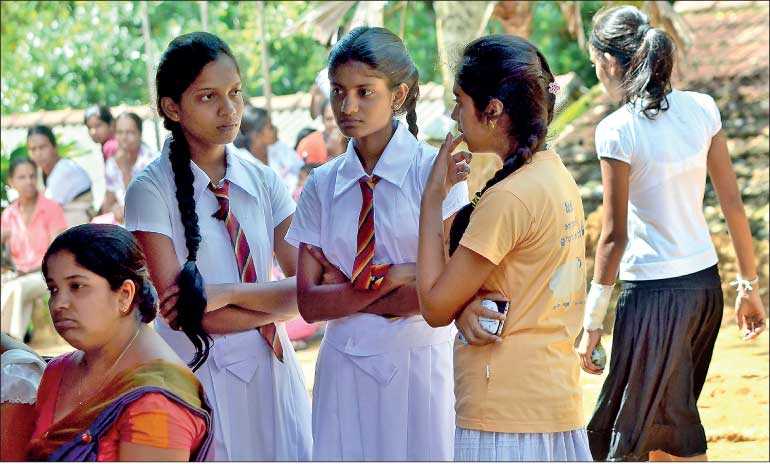Sunday Feb 22, 2026
Sunday Feb 22, 2026
Wednesday, 17 June 2020 00:00 - - {{hitsCtrl.values.hits}}

Even though the students have 3 A passes, they may be not eligible to join a national university in Sri Lanka because of the district quota system and Z score – Pic by Shehan Gunasekara
It’s observed that state universities of Sri Lanka have limited capacities to enrol students for bachelor degree programs. It’s just 20% of the students who qualified in the G.C.E. A/L exam. Further, the international school students who qualified from London A/L, Edexcel A/L, and Cambridge A/L exam could not be admitted to the state universities in Sri Lanka because of the restrictions. 
Sri Lankan universities are still conducting the traditional way of education and in most cases the syllabus and degree courses are not in line with the demand of the job market. There is a major gap in professional education and academic (university) education. So far the Government has not taken satisfactory interference to increase the number of admissions to the national universities in Sri Lanka.
There are few private institutes in Sri Lanka, offering degree programs from foreign universities. However, there is no regulation and control over international and private schools, higher education institutes. There should be a governing body to regulate and control the quality and consistency of private education institutes; moreover, they should be evaluated.
It’s a burning question among the A/L students and their parents the possibility to enter a national university of Sri Lanka even though they have the best results. The Z score and district quota system complicate the university admission process. As per the statistics, just 20% of the students are eligible to enter a national
university.
The critical question is, how to cater to the rest of the 80% of students engage in their higher studies. Is it a personal problem for them or is it a challenge of the system, whether the Government of Sri Lanka has taken adequate steps to increase the number of admission of students.
The writer observed that there are no statistics of the private and international school students in Sri Lanka. Further, it’s a well-known fact that students who have done London/Local A/L exams leave to foreign countries for their bachelor’s degrees. There is a question that arises in the general public including A/L students whether we really need international accredited universities to be set up in Sri Lanka.
This article covers the aspects and the demand for international accredited universities for A/L students in Sri Lanka. It is identified that the volume of research articles and journal articles written regarding the requirement of international accredited universities to A/L students in Sri Lanka is insufficient and inadequate.
There are 25 international schools, as per unconfirmed statistics there are 389 international schools (2019) and 140,000 students (2019). Year of G.C.E A/L 2013 (year of admission 2013/2014) 143,740 students qualified in A/L and 25,200 admitted to national universities. Year of G.C.E A/L 2014 (year of admission 2014/2015) 119,572 students qualified in A/L and 25,643 admitted to national universities. Year of G.C.E A/L 2015 (year of admission 2015/2016) 155,550 students qualified in A/L and 29,055 admitted to national universities. Year of G.C.E A/L 2016 (year of admission 2016/2017) 160,517 students qualified in A/L and 30,662 admitted to national universities. (Source – University Grants Commission)
The possible avenues for A/L students are: Repeat the A/L exam; Study a Degree at Open University of Sri Lanka; Study an External Degree in a National University Sri Lanka; Join a Technical College in Sri Lanka, Study English Language (British Council or any other); Study a degree – Kotelawala Defense University; Study at Sri Lanka Institute of Information Technology; Study to be an Accountant – Chartered Accountant; CIMA, ACCA, AAT, CMA,; Study to be a Lawyer – from Sri Lanka Law college or from Open University of Sri Lanka – Law degree (LLB); Study a degree (local or foreign) which is recognised by the University Grant Commission of Sri Lanka and Ministry of Higher Education Sri Lanka; Leave to a foreign country for higher study – if you/your parents have money; Leave Sri Lanka to a foreign country. E.g. Korea, Japan, Korean Jobs for Sri Lankans; Study a degree in Business Management (Management, Marketing and Accounting); Become a Government Teacher from National Colleges of Education or Vidya Peeta; Study and Become an Engineer; Become a doctor from a foreign medical university; be a nurse or midwife; Find a job, Study Higher National Diploma at SLATE; Study a degree in Information Technology, Study City and Guilds – (Chartered Engineer – British Qualified); Study a course in Multimedia or Graphics Design; Start your own business; Join the Sri Lanka German Technical Institute; Follow a Chemistry Degree. (Source: Hiran – studentlanka.com)
With the writer’s exposure and experience overseas such as Maldives, Malaysia, Singapore, India, it’s observed that the students of South Asian countries are studying in Sri Lanka and have a high demand for international accredited universities. Once the international accredited universities have been established in Sri Lanka, other than the students of Sri Lanka, there will be admissions from the students from South Asian countries. The writer suggests that the Ministry of Higher Education should have to implement a governing body to regulate and evaluate the international/private schools and higher education institutes in Sri Lanka.
The writer had to face certain challenges such as; there are no accurate and reliable statistics of the students who study from international and private schools of Sri Lanka, there are no reliable sources of statistics of the students who are currently studying in overseas universities; the exact demand and the perception of the students and their parents of setting up international accredited universities in Sri Lanka; the amount of outflow and demand for foreign currency for the payments to universities and the relevant expenses (food, lodging, traveling, etc.) from Sri Lankan parents.
As per the discussions with academics and professionals, it is identified why Sri Lanka needs international accredited universities and found the reasons such as limited availability in national universities, even though the students have 3 A passes, they may be not eligible to join a national university in Sri Lanka because of the district quota system and Z score; the university courses and educational methods are obsolete and not what the job market is expecting; the gap between professional education vs. academic education; lack of professional recognition for a degree; the world ranking and the recognition to the local universities; ragging and political involvements; less facilities such as hostels, meals, library; the time frame (1 year to 1.5 years) to enter a university once the students received the A/L results; lack of foreign language knowledge of the students; negative attitudes of the academic/non-academic staff; the degree program not finishing with the stipulated time frames; international school students who qualified from London A/L, Edexcel A/L, and Cambridge A/L students do not get an opportunity to be admitted to the state universities in Sri Lanka.
It’s observed there are no academic journals or proper research have not been conducted to address these issues with the concerns of the demand for international accredited universities, availability of courses preferred, the universities preferred; the spending ability of the parents; which other criteria the students are seeking when selecting a university; is it a gap or barrier to pass IELTS.
(The writer is a Hotelier and
Director of Finance.)